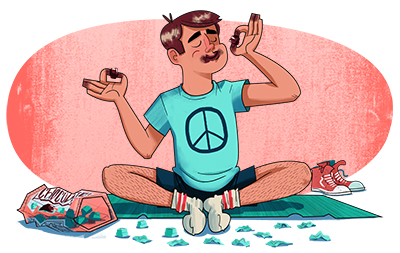
A friend was extolling the virtues of mindful meditation, which he described as “a way to get out of your mind.” My first thought was that I didn’t need it—I’m already out of my mind. But that’s not what he meant. He said your mind is not a healthy place to be. It’s full of worries, fears and beliefs that often have no basis in reality and yet dictate the way we live our lives. I suspected this as early as 1980 when Apple went public at 22 a share and my mind told me not to buy because who would be crazy enough to want a computer in their house?
Mindful meditation gets you away from all that by helping you achieve mindfulness, a state of full awareness in the present moment, undistracted by those countless random thoughts that stream through our consciousness. It sounds a bit like “living in the Now,” which I tried until the day I needed emergency dental surgery for an abscessed tooth and decided that Now was the last place I wanted to be.
Mindfulness, however, is somewhat different. Its purpose is to overcome its opposite—mindlessness—another word which resonated with me for reasons I’d rather not go into. My wife could tell you. Thankfully, I’m not alone. Apparently this is the way most of us live, our minds so cluttered with regrets about the past or worries about the future that we’re barely cognizant of what we’re doing in the present. As a man who goes looking for his car keys while holding them in his hand, I thought perhaps the practice of mindfulness would be useful after all.
So I bought a book. The introduction gave me great hope. It said: “This is a book about how you can find peace and contentment in such frantic and troubled times as these.” I’m happy just to find a parking space close to the downtown YMCA, so things could only improve from here. The introduction went on: “You are not your thoughts,” which was an enormous relief. If you knew my thoughts—and thank God you don’t—you’d understand.
For every one second I focused on my breathing, my mind spent three seconds wondering when a minute would be up.
Rather, my thoughts are simply “mental events,” floating across my mind like clouds in the sky, which I can observe objectively as they come and go, realizing they have no real significance. I tried this and it worked, except for one dark cloud that crosses my mind several times a day and never seems to leave completely—the one that says: If I’d only bought Apple stock at 22 a share!
The first exercise in the book is to simply breathe mindfully for one minute. This means concentrating on your breath as it goes in and out. “After a while,” the book says, “your mind may wander. If you notice this, bring your attention gently back to your breath. After a minute, open your eyes.” I didn’t do so well on this. For every one second I focused on my breathing, my mind spent three seconds wondering when a minute would be up.
Then the book invited me to practice something called The Chocolate Meditation. This is a variation on the “stop and smell the roses” theme where you take the time to really enjoy the food you’re eating instead of gulping it down without even tasting it. The book’s instructions were to choose a piece of chocolate, look at it, feel it, notice the texture and aroma, then put it in your mouth and let it melt slowly. I did this with a bag of Nestlé® Toll House Semi-Sweet Morsels. I experienced one piece as instructed, then another, congratulating myself on my discipline and restraint. Yes, I had truly experienced the essence of chocolateness in those tiny morsels. Too tiny. I was tempted to stuff a whole handful in my mouth like I usually do. But I didn’t. And then I did.
The body scan was next, in which I lay down and focused on each part of my body, from the tips of my toes to the top of my head. I didn’t make it. It was so relaxing I fell asleep somewhere around my abdomen.
If you’re reading this and thinking I’ve failed at mindfulness, that’s just your mind having a thought, which as we know is not necessarily true. And that’s exactly what I plan to tell my wife when she asks what happened to the Nestlé Morsels. We’ll see how that goes.
John Cadley is a former advertising copywriter, freelance writer, and musician living in Fayetteville, New York. Learn more at www.cadleys.com.



 Previous
Previous
 Previous Article
Previous Article